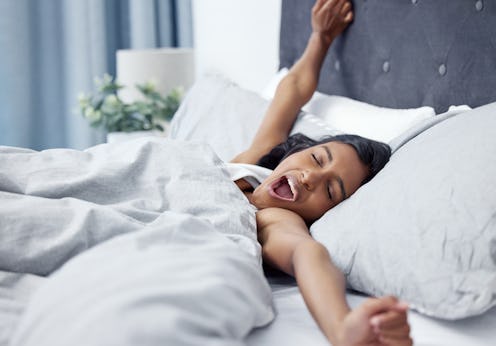Health
Why Do I Wake Up Dehydrated?
Here’s what your body’s trying to tell you.

Waking up in the morning with a mouth drier than ash and a feeling of general malaise often points to one particular condition: dehydration. If this is a regular feature of your morning routine, and it doesn't coincide with hangovers, there could be deeper medical causes. When you wake up dehydrated, your body may be giving you clues to what's actually going on under the surface.
Your body isn't meant to dehydrate naturally overnight. Scientists discovered in 2010 that the body's internal clock, or circadian rhythm, tightly controls the amount of water you lose while you get your 40 winks, making sure that your body remains hydrated while you get your beauty sleep. But, in some of us, that controlled hydration is disrupted, and it's a signal that certain things may be out of alignment. The culprits may be hormones, sleeping styles, lifestyle factors, or underlying illnesses, but waking up without enough hydration in your system is an issue that needs to be fixed.
The symptoms of dehydration will keep dogging you throughout the day. Beyond dry mouth, it can also make you dizzy and confused, and a study in 2018 found that even slight dehydration can influence your concentration, making you zone out when you need to focus. If you do wake up dehydrated, here are some potential reasons why.
1You're Losing Fluids During The Night
Your sleep style itself can influence your dehydration overnight, according to the National Sleep Foundation. "Even if you start the night reasonably well-hydrated, you’ll lose some body fluids simply by breathing while you sleep," they note. Though, some methods of breathing are more prone to causing dehydration than others. "This is especially true if you breathe through your mouth, snore, or have sleep apnea. If you breathe through your nose while you slumber, you won’t lose nearly as much water from your body," says the Foundation.
2You're Having Night Sweats
Sweating in your sleep can be caused by simple overheating or other conditions, including infections, but either way, if you wake up in a pool of sweat in the middle of the night, you're much more likely to feel dehydrated the next day. Night sweats are repeated episodes of extreme perspiration that could soak your pajamas or bed. Treatment of the dehydration needs to target the cause of the sweats themselves, which your doctor can help you suss out.
3Your Bedroom Is Too Warm
While you might like to bake like a loaf in an oven overnight, it's likely to lead to dehydration in the morning. "An overly dry or warm bedroom can also lead to extra fluid loss during the night," says the National Sleep Foundation. Perspiration can mean you wake up parched. Science also indicates that a cooler temperature in bedrooms is better for restful sleep, and sleeping with a humidifier on can help combat dry winter air.
4You Have Lower Levels Of Estrogen
When you're at a part of your menstrual cycle where estrogen dips, you're more likely to be dehydrated, including during your sleeping hours. This is because estrogen is related to the body's ability to retain moisture, and when it dips — both in your regular menstrual cycle and in menopause — your risk of dehydration rises. "Estrogen and progesterone influence your body's hydration levels, and when the two are roller-coastering, like when you're in the throes of PMS, you may need to increase your fluid intake to stay hydrated,” says Health magazine.
5You Exercised Too Late
Another possible culprit for dehydration when you wake up? "A late-day intense exercise session without sufficient rehydration," says the National Sleep Foundation. The problems with late-night exercise go beyond hydration; it can also disrupt your internal clock and sleep cycle, making you tired the next day. Try exercising at the same (slightly earlier) time each day, and making certain to refuel on water after.
6You're Experiencing Medication Side Effects
Several categories of medication increase the risk of dehydration at night, including anti-depressants. Dr. Amy Esposito, M.D., told Self that decongestants are particularly prone to causing dry mouth in the morning: “It’s intended to fix nasal congestion, but the medicine can’t just target nasal vessels, so it just makes everything dry.” Talk to your doctor about whether medications you're taking can increase dehydration.
To target morning dehydration successfully, make sure you're not exercising too late or drinking too much alcohol before bed, and check the side effects of all medications you're currently taking. Get enough water during the day, too; national guidelines recommend that most adult women should drink around 2.7 liters or 11.5 cups of liquid per day. Sleep tight, friends.